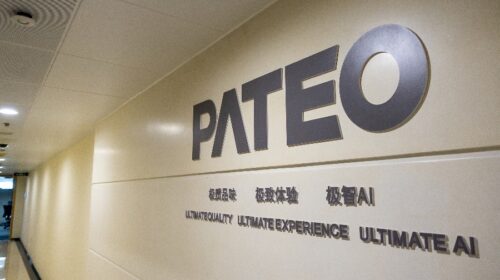Energy Monster snuffed out by sputtering Chinese economy

The rented power bank provider, officially known as Smart Share Global, announced a management-led plan to take the company private at a big premium
Key Takeaways:
- Smart Share Global announced that a group led by its chairman has offered to take the company private at a roughly 70% premium to its latest stock price
- The provider of rented power banks was a victim of China’s slowing economy, and may have worried investors with plunging revenue as it shifted to an asset-light business model
By Doug Young
China’s stumbling economy has de-fanged Smart Share Global Ltd. (EM.US), better known as Energy Monster for its cabinets of smartphone chargers that are a fixture in stores, restaurants and other retail outlets around China. That’s the bottom line coming from this former highflyer, which on Monday announced a management-led buyout offer for the company.
Energy Monster is the latest victim of China’s “consumption downgrade,” which has seen consumers increasingly rein in their spending in a climate of growing economic uncertainty. The downgrade began last year at the top of the retailing food chain, as sellers of big-ticket items like cars and smartphones started to notice shrinking sales. From there it has gradually moved into cheaper, more everyday purchases like clothing and coffee.
Now, its move into the market for rented smartphone chargers really does seem like the downgrade has affected the entire economy. After all, such charging services are quite cheap, typically costing just 3 yuan, or less than $0.50, for a half-hour charge. You know things are bad when consumers are cutting back on such little everyday purchases that they probably wouldn’t have even thought twice about in the past.
We haven’t seen too many privatization bids like this one so far, as Chinese companies with depressed share prices waited to see if their stocks would rebound with the end of the pandemic. But a growing number of companies are increasingly running out of patience as their shares continue to languish two years after China ended its strict pandemic controls.
Conglomerate Fosun is one such company, launching privatization bids for its Henlius (2696.HK) drug-making unit and Fosun Tourism (1992.HK), owner of the Club Med resort chain, in the latter part of last year. The profitable but underappreciated data center operator Chindata also went private in 2023 in a deal engineered by major shareholder and private equity giant Bain. Large-screen movie specialist Imax (IMAX.US) also launched a bid to privatize its Imax China (1970.HK) unit in 2023, though that bid ultimately failed.
We suspect this latest bid led by Energy Monster Chairman and CEO Cai Guangyuan, who also uses the English name Mars, could be the start of a coming wave of similar offers by companies tired of seeing their shares languish. While funding for such buyouts is inevitably tighter in the current environment than in the past, there’s still clearly enough private equity looking for good investments to fund such deals.
In this case, the private equity is coming from Trustar, the private equity unit of financial conglomerate Citic. What’s slightly interesting about this case compared with some of the others we’ve seen is the large premium the group is offering, namely about 70% above the stock’s recent trading prices. In the past, we’ve generally seen premiums more in the 10% to 20% range, and this higher level nicely shows just how undervalued the company’s managers and Trustar believe the shares are.
IPO charge
Things were far different when Energy Monster went public in April 2021, just a year into the pandemic and shortly before investors began to sour on offshore-listed Chinese stocks. The company raised $150 million in its Nasdaq listing by selling American depositary shares (ADS) for $8.50 apiece. That valued the company, whose name was synonymous in China with rentable chargers, at $2.2 billion.
The stock has mostly trended downward since then and fell as low as $0.50 last year. The shares jumped nearly 40% on Monday after the announcement. But even after that, their Monday close of $1 was still well below the proposed buyout price of $1.25 per ADS.
Energy Monster’s issues are both company-specific and also related to the broader economic slowdown. At the company level, Energy Monster has been undergoing a major shift from an asset-heavy model of owning and operating its cabinets of chargers to an asset-light model where it provides services to partners who actually own and operate those chargers.
Such a shift looks smart over the longer term, as it will put less pressure on the company’s finances and should significantly boost its margins. But in the shorter term, the shift has resulted in some major revenue declines, which never look attractive to investors.
Astute investors may have noticed the company failed to report third-quarter results at the usual time back in November, which, in hindsight, was almost certainly a signal that it was working on the buyout offer.
But in its second-quarter financial results announced in August, the company reported its revenue tumbled 55.3% year-on-year to 463 million yuan ($63 million) as it transitioned to the asset-light model. Its cost of revenue fell by an even larger 67%, thanks to far lower operating costs under the new model. And while the company still reported an operating loss for the quarter, it was profitable on a net basis.
In a rising economy, this kind of shift to an asset-light model probably would have appealed more to investors. But China’s economy is no longer the growth engine it once was, and the company’s fading appeal was reflected in the fact that just one major analyst, from Citi, was present on its latest investor earnings call. And Chairman Cai’s response to her question about the company’s outlook for the second half of the year was hardly reassuring.
“Results are oscillating with no definitive trend of a rebound as of the end of the second quarter,” Cai said. Company executives said that Energy Monster was exploring opportunities outside China, which has become a growing theme among companies looking desperately for ways to leverage their rich experience in more dynamic markets. But they declined to give any specifics, which indicates such initiatives are still in their early days.
At the end of the day, Energy Monster was probably mostly a victim of bad timing. Its IPO came just before Chinese stocks fell out of vogue with western investors, and its big shift in business model probably turned off many of those same investors with its rapidly shrinking revenue. With all those negative factors swirling around it, China’s economic slowdown was really just the nail in the coffin to any hopes it might have harbored of regaining investor favor anytime soon.
To subscribe to Bamboo Works free weekly newsletter, click here






